Unit 1 Women of achievement Reading 课件(60张PPT)
文档属性
| 名称 | Unit 1 Women of achievement Reading 课件(60张PPT) | 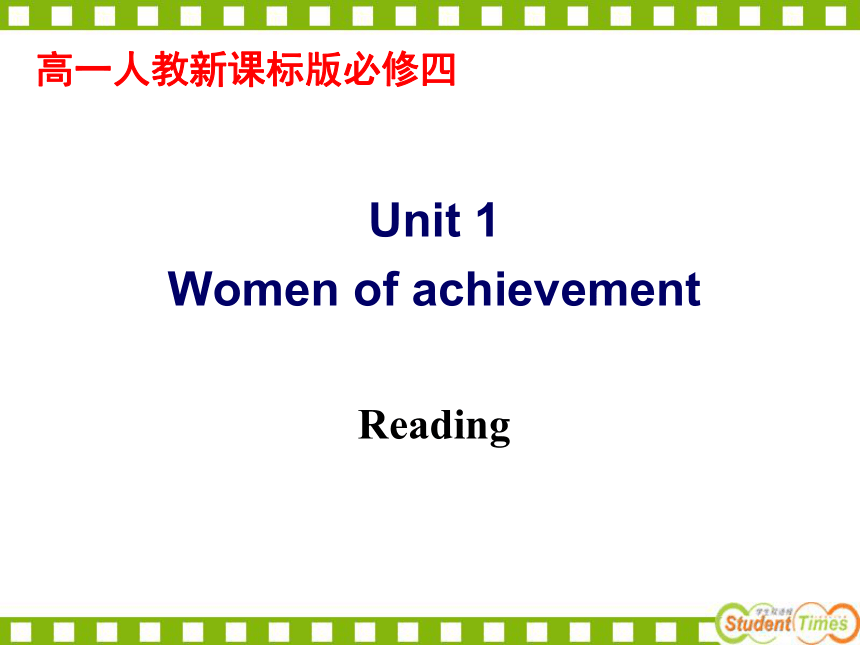 | |
| 格式 | zip | ||
| 文件大小 | 2.4MB | ||
| 资源类型 | 教案 | ||
| 版本资源 | 人教版(新课程标准) | ||
| 科目 | 英语 | ||
| 更新时间 | 2019-10-26 07:35:32 | ||
图片预览

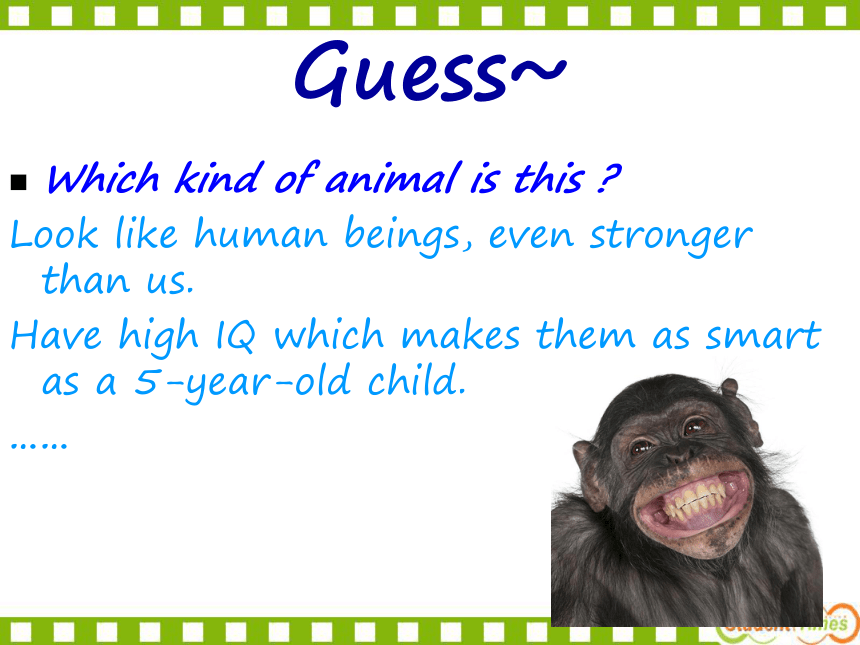
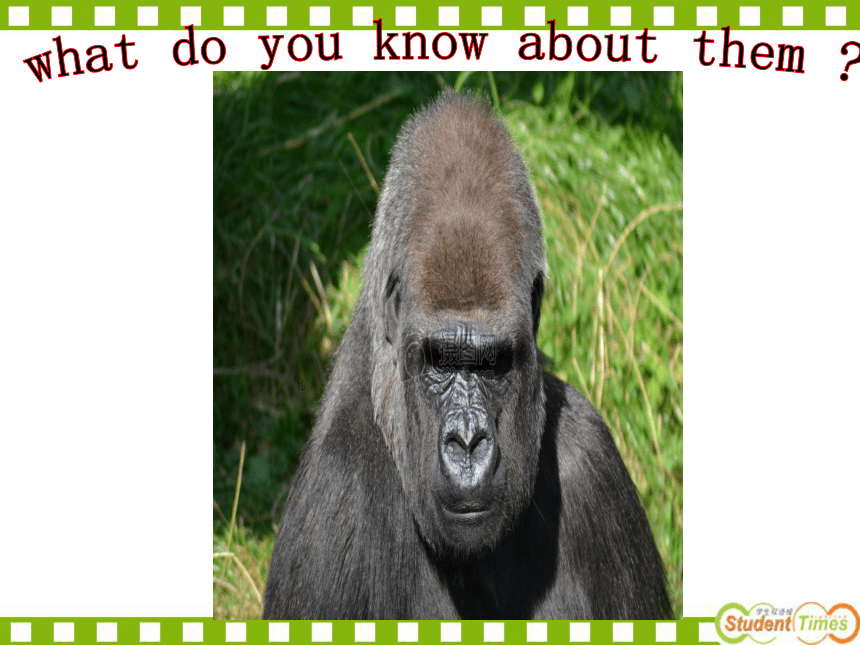
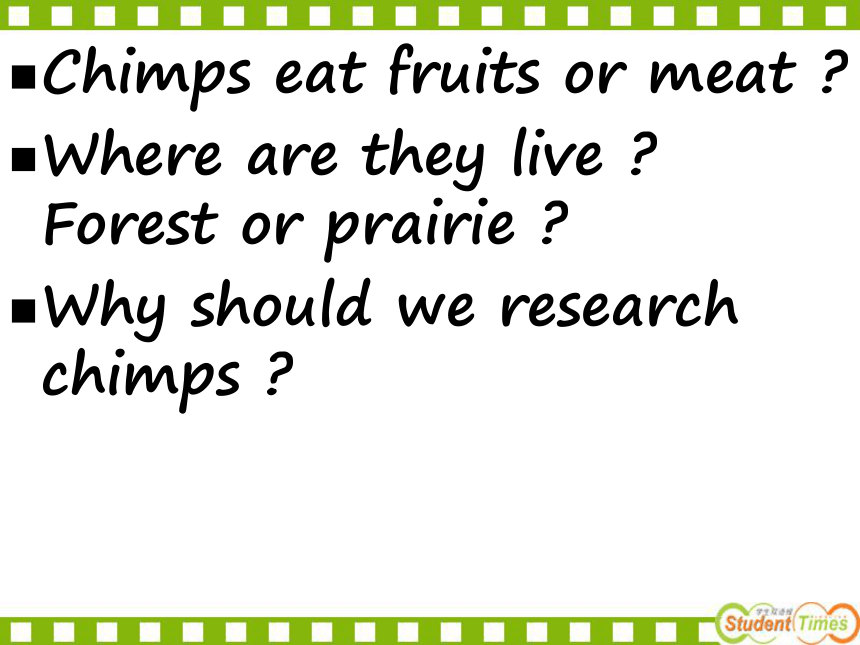
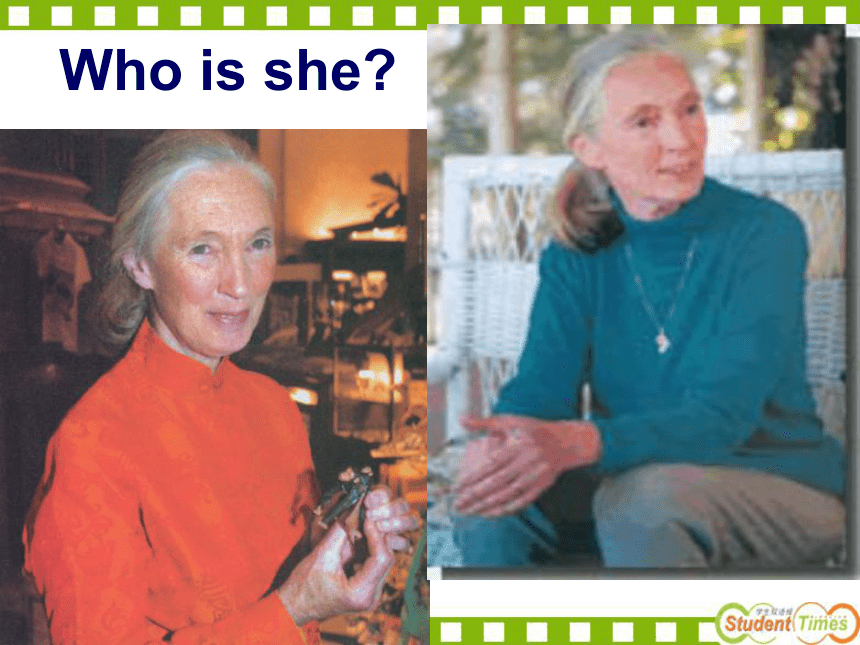
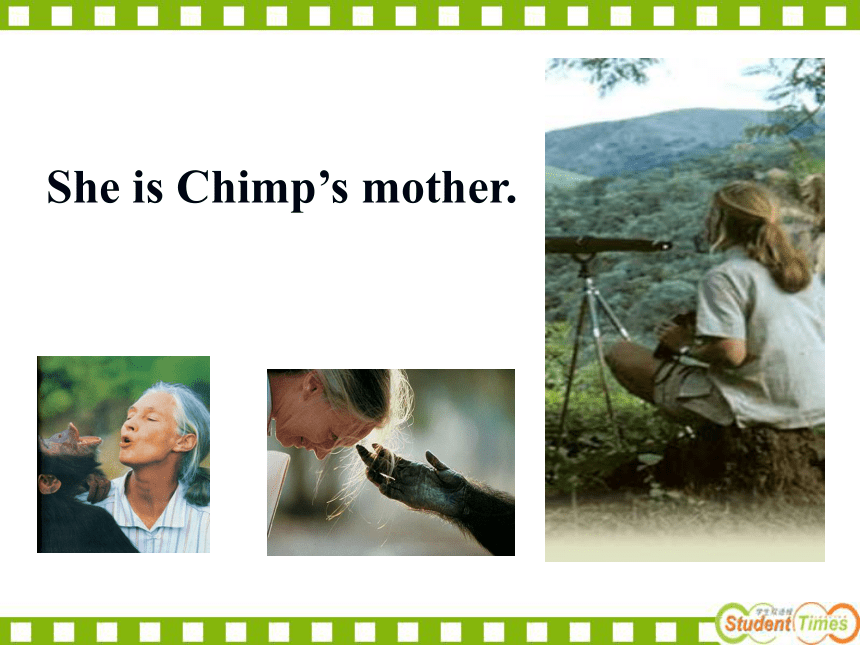
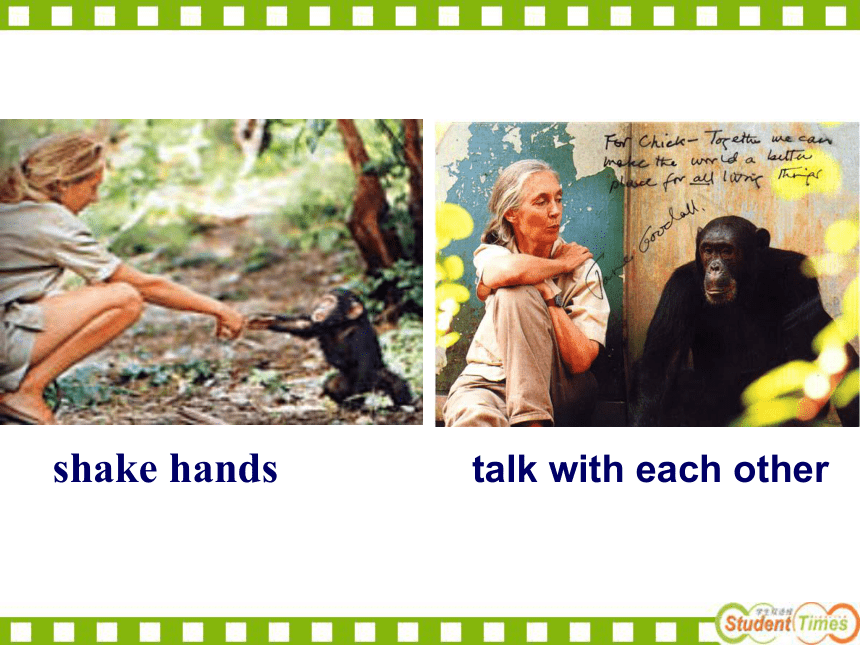

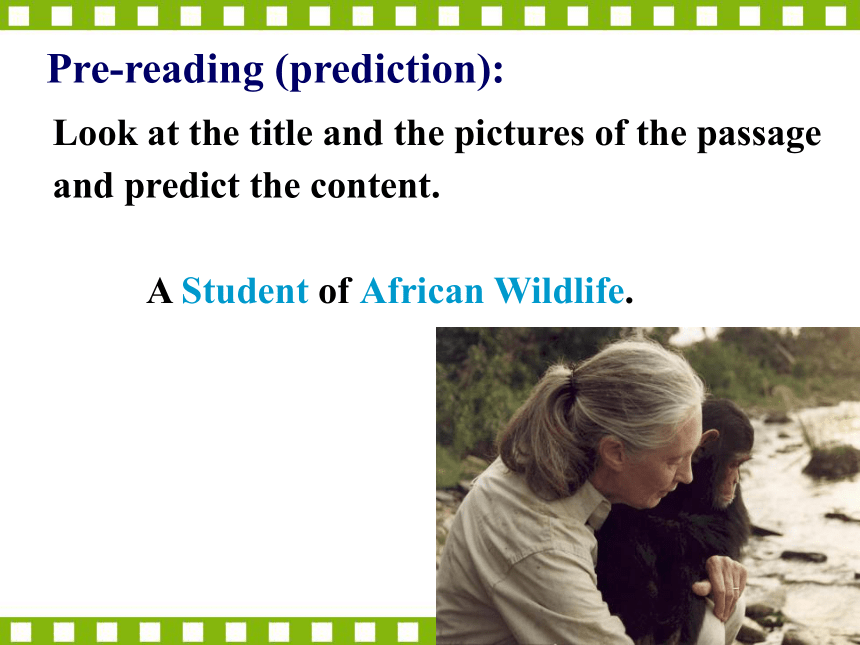
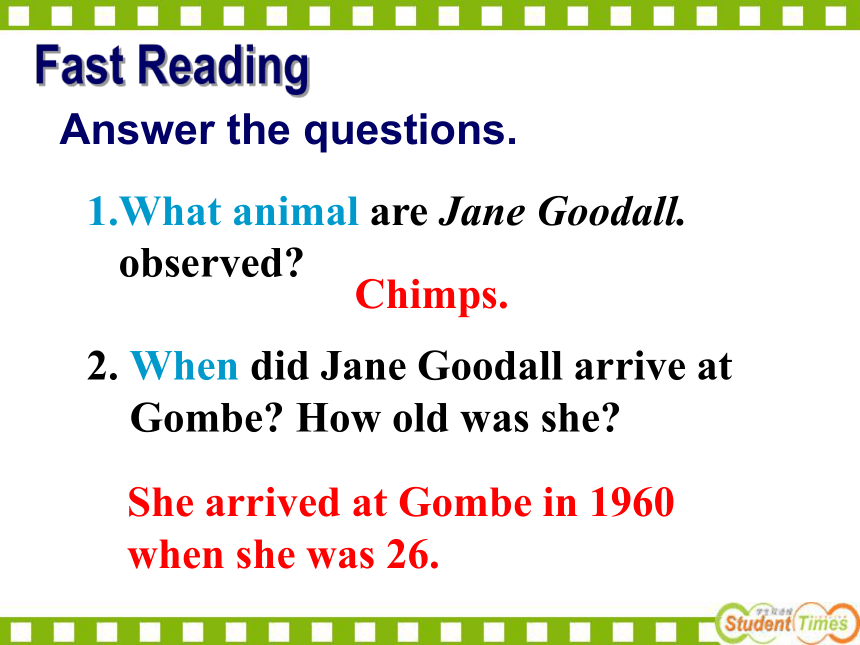
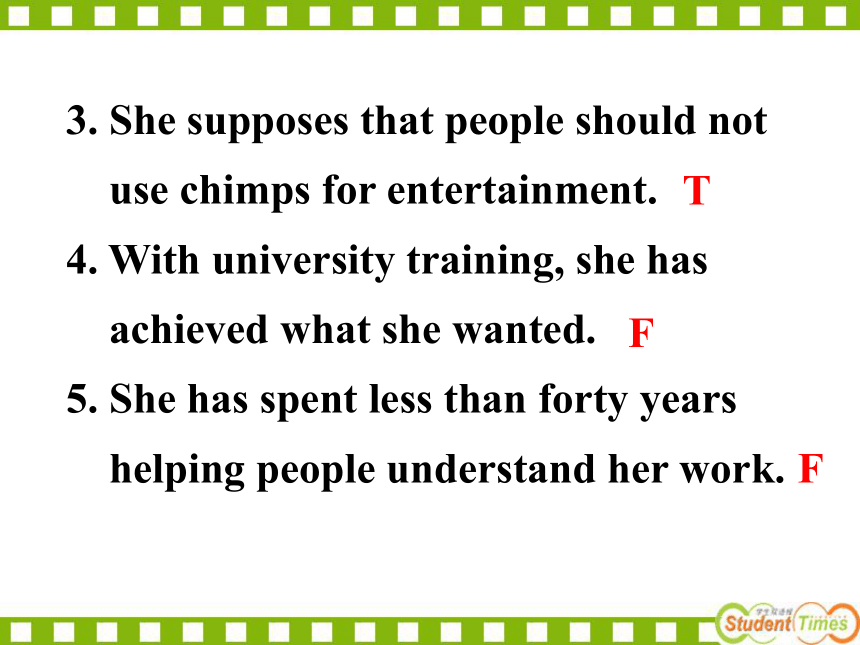
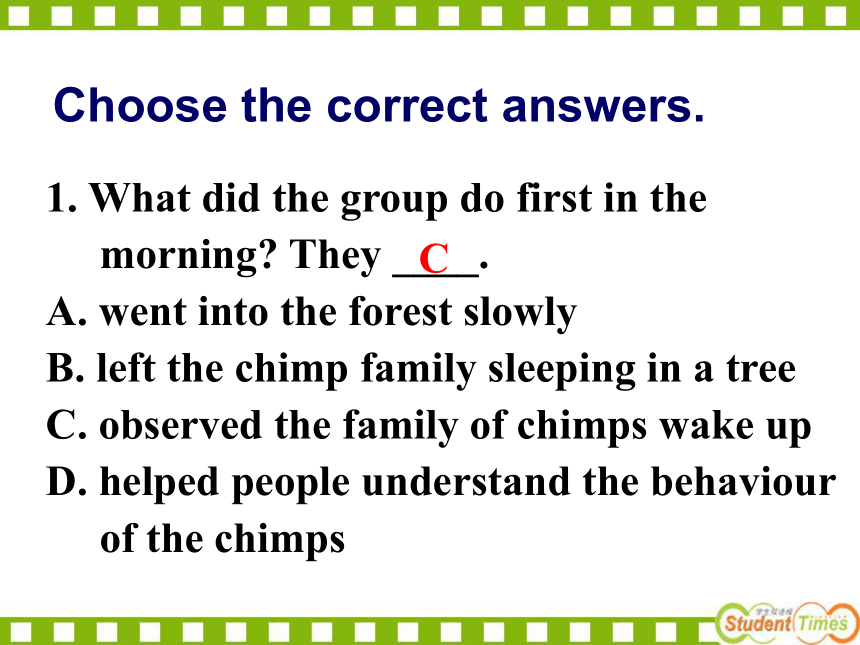
文档简介
(共60张PPT)
Unit 1
Women of achievement
Reading
高一人教新课标版必修四
Guess~
Which kind of animal is this ?
Look like human beings, even stronger than us.
Have high IQ which makes them as smart as a 5-year-old child.
……
Chimps eat fruits or meat ?
Where are they live ? Forest or prairie ?
Why should we research chimps ?
Who is she?
She is Chimp’s mother.
shake hands talk with each other
Why can she get along well with
the chimp?
Pre-reading (prediction):
Look at the title and the pictures of the passage
and predict the content.
A Student of African Wildlife.
What animal are Jane Goodall.
observed?
2. When did Jane Goodall arrive at
Gombe? How old was she?
Chimps.
She arrived at Gombe in 1960 when she was 26.
Answer the questions.
3. She supposes that people should not
use chimps for entertainment.
4. With university training, she has
achieved what she wanted.
5. She has spent less than forty years
helping people understand her work.
F
T
F
1. What did the group do first in the
morning? They ____.
went into the forest slowly
left the chimp family sleeping in a tree
observed the family of chimps wake up
helped people understand the behaviour
of the chimps
C
Choose the correct answers.
2. Why did Jane go to Africa to study
chimps in the wild? Because she
wanted _____.
A. to work with them in their own
environment
B. to prove the way people think about
chimps was wrong
C. to discover what chimps eat
D. to observe a chimp family
A
3. Jane was permitted to begin her
work after ___.
the chimp family woke up
B. she lived in the forest
C. her mother came to support her
D. she arrived at Gombe
C
4. The purpose of her study was to ___.
A. watch the wild chimps in cages
B. gain a doctor’s degree
C. understand and respect the
lives of chimps
D. live in the forest as men can
C
Fill in the chart.
1. Studied chimps in their natural environment
2. Lived in the forest so she could observe
the chimps and record their activities
3. Found what chimps eat and their social
system
4. Tried to make people aware that it is
wrong to use chimps for entertainment
or advertisements
What did Jane do after she came to Africa?
1. Helped to set up special places where
chimps can live safely in the wild
2. Got a doctor’s degree
3. Showed that women can live in the
forest to study wild animals as men can
4. Inspired others who wanted to cheer
the achievements of women
What did she achieve?
The main ideas of each paragraph
Paragraph 1: How the group followed
Jane’s way of studying chimps in the wild
Paragraph 2: What Jane discovered about chimps
Paragraph 3: How Jane tries to protect the lives of chimps in their natural habitat
Paragraph 4: Jane’s achievements
A student of African wildlife
↓
⑴ ⑵ ⑶
↓
⑷
A day in the
park
Jane’s way to
study chimps and
her achievement.
Her attitude
to the animals
She has achieved everything she wanted to do.
Watching a family of chimps wake up
Wander off into the forest (feed, clean each other)
The mother chimp and her babies play in the tree
Come into mother’s chimp arms, go to sleep together in their nest
Para 1
The whole day
Para 2
She discovered that chimps hunt and eat meat.
She observed chimps as a group hunting a monkey and then eating it.
She also discovered how chimps communicate with each other.
Discoveries:
The first thing
The second thing
The third thing
True or false
She hopes that chimps can be left in the forest.
She supposes that people should not use chimps for entertainment.
Para 3
T
T
She has spent more than forty years helping people understand her work.
She has built many homes for the wild animals to live in.
T
T
Para 4
Working with animals in their own environment.
Gaining a doctor’s degree for her studies.
Showing that women can live in the forest as men can.
The achievement of Jane:
The passage is mainly about how Jane
Goodall worked with
_____________________________
and help people _____________________
__________ of these animals.
chimps in their environment
understand and respect
the life
1. Why do you think Jane is called a
student of African wildlife?
Because she studied animals and learns from them in their own habitat.
Discussion
2. What did Jane have to give up when
she went to live in the forest?
She had to give up friends, a social life, boyfriends, fun, going to the cinema, seeing her friends, parties, shopping, etc.
3. Do you think it is important to study
chimps in the wild rather than in a zoo?
Give reasons.
Yes, because it is only in their natural environment that chimps will behave naturally.
We have a choice to use the gift
of our lives to make the world
a better place.
-----Jane Goodall
1. Our group are all going to visit the
chimps in the forest.
我们一行人准备去拜访森林里的黑猩猩。
英语中有许多集体名词作主语时, 谓语动词
的单复数要根据集体名词的含义来定。如果
名词表示的是一个整体概念, 谓语动词要用
单数形式; 如果名词表示的是集体中的成员,
谓语动词要用复数形式。
这类的集体名词有: class, crew, family,
public, government等。
A committee of five men and three
women is to consider the matter.
The class were all out for play when
class was over.
2. behave 1) vi. 行为;举止
她表现出了很大的勇气。
She behaved with great courage.
他对顾客的态度不好。
He _______________ to the customers.
2) vt. & vi. 举止适当或有礼
你应该学会举止得体。
You should learn to behave.
behaved badly
3) vi. (指事物)有某种作用
我的摄像机自从修好后一直很正常。
My camera has been behaving well since
it was repaired.
【拓展】
behaviour n. 举止; 行为
behave oneself 守规矩
behave well / badly 行为好/不好
be on one’s good behavior 举止规矩
根据汉语提示完成英语句子。
1) 你今天在晚会上守规矩了吗?
Did you ______________ at the party
today?
2) 这孩子在校行为良好。
The child ____________ at school.
behave yourself
behaved well
3. Watching a family of chimps wake up
is our … 今天我们的第一件事是……
动名词作主语
主语是由不定式、动名词、从句构成的,
谓语动词采用单数。
Working?with?you?is?pleasant.
Seeing is believing.
4. This means going back to a place where we
left the chimp family sleeping in a tree the
night before.
1) 由定语从句修饰的place做go的宾语。
2) leave+宾语+doing “让某人做某事”
keep, find, notice, have, feel, hear, see, leave...
等动词后常用V-ing形式作宾语补足语。如:
We found the old lady lying in bed.
我们发现那老太太躺在床上。
Don’t leave her waiting outside in the rain.
不要让她在外面雨中等待着。
5. But the evening makes it all worthwhile.
1) worthwhile: adj. 值得(花精力、时间、
金钱做) 的
Mandela’ struggle is very worthwhile.
That was a worthwhile trip.
那是很有价值的旅行。
It’s worthwhile doing/to do sth.
a worthwhile experiment
2) worthful adj. 有价值的, 可贵的
3) worthless adj. 没有价值的, 无用的, 无益的
4) worth: adj. 值得的 worth it 有用, 值得……
这辆自行车值50英镑。
The bicycle is worth £50.
这个博物馆(非常)值得参观。
The museum is (well) worth visiting.
be (well) worth + n. / doing sth.
5) worthy: adj. 值得的
be worthy to be done
be worthy of + being done / n.
e.g. He is worthy of our praise.
6. we watch the mother chimp and her
babies play in the tree.
我们看到黑猩猩妈妈跟她的幼子们在树上
玩耍。
in the tree 指树本身以外的事物或人
附着在树上, 如鸟等动物; on the tree
指树本身生长出来的东西, 如果实、花等。
7. Jane spent many years observing and
recording their daily activities.
1) …spend + …time (in) doing
We spent a pleasant hour or two talking
with friends.
He’s spent half his life writing this book.
He has spent three years in prison.
2) observe
vi. & vt. 观察注意到
observe + n./pron./sb. doing/do sth/that从句
这位科学家一生都在观察星星。
The scientist has observed the stars all his life.
我看到一个陌生人正在进办公室。
I observed a stranger go/going into the office.
我注意到班上有几个学生睡着了。
I observed that several students were asleep
in class.
vt. 遵守, 顺从
我们必须遵守交通规则。
We must ______________________.
vt. 举行(仪式等), 庆祝(节日等)
你们国家的人庆祝圣诞节吗?
Do you ______________________ in your
country?
observe用作被动语态时, 作主语补足语的
不定式须带to。
She was observed to enter the bank.
有人注意到她走进银行。
observe the traffic rules
observe Christmas Day
【拓展】
1) 同根词: observation n. 观察; 监视
observer n. 观察者; 遵守者
2) 常见搭配:
observe sb do sth 注意到某人做了某事
(表示动作全过程)
observe sb doing sth 注意到某人正在做
某事 (表示动作正在进行)
under observation 在观察中; 在监视下
8. Only after her mother came to help her
for the first few months was she allowed to
begin her project.
Only +状语(从句), 放在句首时, 主句要
用部分倒装, 即把助动词do、does 或did/动词
/系动词be 提到主语前面。
只有这样, 我们才能学好英语。
Only in this way can we learn English better.
Only then did we get to know each other better.
如果句子为主从复合句, 则主句倒装, 从句
不倒装。
Only after new China was founded was he
able to go to school.
Only in this way can we learn English better.
但当only在句首修饰句子的主语时, 不用倒装
语序。
Only you understand me. 只有你了解我。
Only Mary and Tom failed in the exam.
I failed in the final examination last term
and only then ____ the importance of
studies.
A. I realized B. I had realized
C. had I realized D. did I realize
D
9. She also discovered how chimps communicate
with each other and her study of their body
language helped her work out their social system.
1) I can’t work out the meaning of
the poem.
2) Things have worked out badly.
3) Work out his income.
4) Work out a plan.
(理解, 说出)
(发展, 进行)
(算出)
(制定,拟订)
10. For forty years Jane Goodall has been
outspoken about making the rest of the world
understand and respect the life of these animals.
1) outspoken adj. 直言不讳的
As a former schoolmaster, he has always been
outspoken on education issues and a firm
supporter of traditional learning methods.
作为前任校长, 他总是就教育问题坦率地
发表意见,坚定地支持传统的学习方法。
2) the rest of: 它之后可以接不可数名词或可数
名词, 但要注意含义, 以便决定后面动词的
单复数形式。
e.g. The rest of the money was given to his
son.
The rest of the apple was thrown away.
The rest of the apples were sent to the
nursing home.
3) respect在句中用作动词, 表示“尊重; 尊敬”。
e.g. He is a man whom I believe we should
respect. 我相信他是个我们应当尊敬的人。
I do not respect him because he often
tells lies. 我不尊敬他, 因为他经常撒谎。
【拓展】
Respect 还可用作名词, 表示“尊敬; 敬重”。
e.g. They have a great respect for his ability.
他们十分尊重他的才能。
常见短语:
show respect for 对……表示尊敬
have respect for 尊敬; 重视
give ones respects to 向……问候
根据汉语提示, 完成下列句子。
All the students ______________ (尊敬)
their history teacher.
2) The professor is a specialist in the research
of ancient literature and we all ______________
(对……表示尊敬) him.
have respect for
show respect for
11. She has argued that wild animals should be
left in the wild and not used for entertainment
or advertisements.
argue (vt.) +n./clause(从句)/sb. to be…
我们据理力争我们应该得到更高的薪水。
We argued __________________________.
他花钱的方式说明他很富有。
The way he spends money ________________.
that we should be paid more
argues him to be rich
argue (vi.) +with sb. about/over sth.
同某人辩论某事
他们正在和同学争论这个问题的解决方法。
They are arguing with their classmates
about the solution to the problem.
他们正在争执战争是否正当。
They are arguing with each other about
the justice of the war.
argue for/against 为反对……而辩论
工人们为争取罢工的权力而辩论。
The workers argued for the right to strike.
一些人为反对自由贸易辩论。
Some people argue against free trade.
argue about / over sth 为某事而争论
argue with sb 与某人争论
argue for 为……辩护
argue sb into / out of doing sth 说服某人做
(不做)某事
in argument about sth 为某事而争论
12. lead a …life 表示“过着……的生活”
e.g. My parents are retired and now lead a
quiet life.
我的父母都退休了, 现在过着安静的生活。
lead to 导致
lead up to 引导到; 把……一直引到
lead the way 带路
If we want to lead a peaceful life, we
cannot help but object to war.
如果我们要过和平的生活, 一定要
反对战争。
We hope to lead a happy life.
我们希望拥有幸福的生活。
13. inspire v. 鼓舞; 激发; 启示
inspired adj. 有灵感的
inspiring adj. 激励人心的
inspiration n.
She was an ___________ to all of us.
The president made an _________
speech at the meeting yesterday.
I am _________ by this book.
inspiring
inspired
inspiration
He was an ____ poet at that time and
his ____ poems spread through all the
country.
inspired; inspired
B. inspiring; inspired
C. inspired; inspiring
D. inspiring; inspiring
D
Finish the exercises on Page 4
and Page 5. Make some preparations
for the next class.
Homework
Unit 1
Women of achievement
Reading
高一人教新课标版必修四
Guess~
Which kind of animal is this ?
Look like human beings, even stronger than us.
Have high IQ which makes them as smart as a 5-year-old child.
……
Chimps eat fruits or meat ?
Where are they live ? Forest or prairie ?
Why should we research chimps ?
Who is she?
She is Chimp’s mother.
shake hands talk with each other
Why can she get along well with
the chimp?
Pre-reading (prediction):
Look at the title and the pictures of the passage
and predict the content.
A Student of African Wildlife.
What animal are Jane Goodall.
observed?
2. When did Jane Goodall arrive at
Gombe? How old was she?
Chimps.
She arrived at Gombe in 1960 when she was 26.
Answer the questions.
3. She supposes that people should not
use chimps for entertainment.
4. With university training, she has
achieved what she wanted.
5. She has spent less than forty years
helping people understand her work.
F
T
F
1. What did the group do first in the
morning? They ____.
went into the forest slowly
left the chimp family sleeping in a tree
observed the family of chimps wake up
helped people understand the behaviour
of the chimps
C
Choose the correct answers.
2. Why did Jane go to Africa to study
chimps in the wild? Because she
wanted _____.
A. to work with them in their own
environment
B. to prove the way people think about
chimps was wrong
C. to discover what chimps eat
D. to observe a chimp family
A
3. Jane was permitted to begin her
work after ___.
the chimp family woke up
B. she lived in the forest
C. her mother came to support her
D. she arrived at Gombe
C
4. The purpose of her study was to ___.
A. watch the wild chimps in cages
B. gain a doctor’s degree
C. understand and respect the
lives of chimps
D. live in the forest as men can
C
Fill in the chart.
1. Studied chimps in their natural environment
2. Lived in the forest so she could observe
the chimps and record their activities
3. Found what chimps eat and their social
system
4. Tried to make people aware that it is
wrong to use chimps for entertainment
or advertisements
What did Jane do after she came to Africa?
1. Helped to set up special places where
chimps can live safely in the wild
2. Got a doctor’s degree
3. Showed that women can live in the
forest to study wild animals as men can
4. Inspired others who wanted to cheer
the achievements of women
What did she achieve?
The main ideas of each paragraph
Paragraph 1: How the group followed
Jane’s way of studying chimps in the wild
Paragraph 2: What Jane discovered about chimps
Paragraph 3: How Jane tries to protect the lives of chimps in their natural habitat
Paragraph 4: Jane’s achievements
A student of African wildlife
↓
⑴ ⑵ ⑶
↓
⑷
A day in the
park
Jane’s way to
study chimps and
her achievement.
Her attitude
to the animals
She has achieved everything she wanted to do.
Watching a family of chimps wake up
Wander off into the forest (feed, clean each other)
The mother chimp and her babies play in the tree
Come into mother’s chimp arms, go to sleep together in their nest
Para 1
The whole day
Para 2
She discovered that chimps hunt and eat meat.
She observed chimps as a group hunting a monkey and then eating it.
She also discovered how chimps communicate with each other.
Discoveries:
The first thing
The second thing
The third thing
True or false
She hopes that chimps can be left in the forest.
She supposes that people should not use chimps for entertainment.
Para 3
T
T
She has spent more than forty years helping people understand her work.
She has built many homes for the wild animals to live in.
T
T
Para 4
Working with animals in their own environment.
Gaining a doctor’s degree for her studies.
Showing that women can live in the forest as men can.
The achievement of Jane:
The passage is mainly about how Jane
Goodall worked with
_____________________________
and help people _____________________
__________ of these animals.
chimps in their environment
understand and respect
the life
1. Why do you think Jane is called a
student of African wildlife?
Because she studied animals and learns from them in their own habitat.
Discussion
2. What did Jane have to give up when
she went to live in the forest?
She had to give up friends, a social life, boyfriends, fun, going to the cinema, seeing her friends, parties, shopping, etc.
3. Do you think it is important to study
chimps in the wild rather than in a zoo?
Give reasons.
Yes, because it is only in their natural environment that chimps will behave naturally.
We have a choice to use the gift
of our lives to make the world
a better place.
-----Jane Goodall
1. Our group are all going to visit the
chimps in the forest.
我们一行人准备去拜访森林里的黑猩猩。
英语中有许多集体名词作主语时, 谓语动词
的单复数要根据集体名词的含义来定。如果
名词表示的是一个整体概念, 谓语动词要用
单数形式; 如果名词表示的是集体中的成员,
谓语动词要用复数形式。
这类的集体名词有: class, crew, family,
public, government等。
A committee of five men and three
women is to consider the matter.
The class were all out for play when
class was over.
2. behave 1) vi. 行为;举止
她表现出了很大的勇气。
She behaved with great courage.
他对顾客的态度不好。
He _______________ to the customers.
2) vt. & vi. 举止适当或有礼
你应该学会举止得体。
You should learn to behave.
behaved badly
3) vi. (指事物)有某种作用
我的摄像机自从修好后一直很正常。
My camera has been behaving well since
it was repaired.
【拓展】
behaviour n. 举止; 行为
behave oneself 守规矩
behave well / badly 行为好/不好
be on one’s good behavior 举止规矩
根据汉语提示完成英语句子。
1) 你今天在晚会上守规矩了吗?
Did you ______________ at the party
today?
2) 这孩子在校行为良好。
The child ____________ at school.
behave yourself
behaved well
3. Watching a family of chimps wake up
is our … 今天我们的第一件事是……
动名词作主语
主语是由不定式、动名词、从句构成的,
谓语动词采用单数。
Working?with?you?is?pleasant.
Seeing is believing.
4. This means going back to a place where we
left the chimp family sleeping in a tree the
night before.
1) 由定语从句修饰的place做go的宾语。
2) leave+宾语+doing “让某人做某事”
keep, find, notice, have, feel, hear, see, leave...
等动词后常用V-ing形式作宾语补足语。如:
We found the old lady lying in bed.
我们发现那老太太躺在床上。
Don’t leave her waiting outside in the rain.
不要让她在外面雨中等待着。
5. But the evening makes it all worthwhile.
1) worthwhile: adj. 值得(花精力、时间、
金钱做) 的
Mandela’ struggle is very worthwhile.
That was a worthwhile trip.
那是很有价值的旅行。
It’s worthwhile doing/to do sth.
a worthwhile experiment
2) worthful adj. 有价值的, 可贵的
3) worthless adj. 没有价值的, 无用的, 无益的
4) worth: adj. 值得的 worth it 有用, 值得……
这辆自行车值50英镑。
The bicycle is worth £50.
这个博物馆(非常)值得参观。
The museum is (well) worth visiting.
be (well) worth + n. / doing sth.
5) worthy: adj. 值得的
be worthy to be done
be worthy of + being done / n.
e.g. He is worthy of our praise.
6. we watch the mother chimp and her
babies play in the tree.
我们看到黑猩猩妈妈跟她的幼子们在树上
玩耍。
in the tree 指树本身以外的事物或人
附着在树上, 如鸟等动物; on the tree
指树本身生长出来的东西, 如果实、花等。
7. Jane spent many years observing and
recording their daily activities.
1) …spend + …time (in) doing
We spent a pleasant hour or two talking
with friends.
He’s spent half his life writing this book.
He has spent three years in prison.
2) observe
vi. & vt. 观察注意到
observe + n./pron./sb. doing/do sth/that从句
这位科学家一生都在观察星星。
The scientist has observed the stars all his life.
我看到一个陌生人正在进办公室。
I observed a stranger go/going into the office.
我注意到班上有几个学生睡着了。
I observed that several students were asleep
in class.
vt. 遵守, 顺从
我们必须遵守交通规则。
We must ______________________.
vt. 举行(仪式等), 庆祝(节日等)
你们国家的人庆祝圣诞节吗?
Do you ______________________ in your
country?
observe用作被动语态时, 作主语补足语的
不定式须带to。
She was observed to enter the bank.
有人注意到她走进银行。
observe the traffic rules
observe Christmas Day
【拓展】
1) 同根词: observation n. 观察; 监视
observer n. 观察者; 遵守者
2) 常见搭配:
observe sb do sth 注意到某人做了某事
(表示动作全过程)
observe sb doing sth 注意到某人正在做
某事 (表示动作正在进行)
under observation 在观察中; 在监视下
8. Only after her mother came to help her
for the first few months was she allowed to
begin her project.
Only +状语(从句), 放在句首时, 主句要
用部分倒装, 即把助动词do、does 或did/动词
/系动词be 提到主语前面。
只有这样, 我们才能学好英语。
Only in this way can we learn English better.
Only then did we get to know each other better.
如果句子为主从复合句, 则主句倒装, 从句
不倒装。
Only after new China was founded was he
able to go to school.
Only in this way can we learn English better.
但当only在句首修饰句子的主语时, 不用倒装
语序。
Only you understand me. 只有你了解我。
Only Mary and Tom failed in the exam.
I failed in the final examination last term
and only then ____ the importance of
studies.
A. I realized B. I had realized
C. had I realized D. did I realize
D
9. She also discovered how chimps communicate
with each other and her study of their body
language helped her work out their social system.
1) I can’t work out the meaning of
the poem.
2) Things have worked out badly.
3) Work out his income.
4) Work out a plan.
(理解, 说出)
(发展, 进行)
(算出)
(制定,拟订)
10. For forty years Jane Goodall has been
outspoken about making the rest of the world
understand and respect the life of these animals.
1) outspoken adj. 直言不讳的
As a former schoolmaster, he has always been
outspoken on education issues and a firm
supporter of traditional learning methods.
作为前任校长, 他总是就教育问题坦率地
发表意见,坚定地支持传统的学习方法。
2) the rest of: 它之后可以接不可数名词或可数
名词, 但要注意含义, 以便决定后面动词的
单复数形式。
e.g. The rest of the money was given to his
son.
The rest of the apple was thrown away.
The rest of the apples were sent to the
nursing home.
3) respect在句中用作动词, 表示“尊重; 尊敬”。
e.g. He is a man whom I believe we should
respect. 我相信他是个我们应当尊敬的人。
I do not respect him because he often
tells lies. 我不尊敬他, 因为他经常撒谎。
【拓展】
Respect 还可用作名词, 表示“尊敬; 敬重”。
e.g. They have a great respect for his ability.
他们十分尊重他的才能。
常见短语:
show respect for 对……表示尊敬
have respect for 尊敬; 重视
give ones respects to 向……问候
根据汉语提示, 完成下列句子。
All the students ______________ (尊敬)
their history teacher.
2) The professor is a specialist in the research
of ancient literature and we all ______________
(对……表示尊敬) him.
have respect for
show respect for
11. She has argued that wild animals should be
left in the wild and not used for entertainment
or advertisements.
argue (vt.) +n./clause(从句)/sb. to be…
我们据理力争我们应该得到更高的薪水。
We argued __________________________.
他花钱的方式说明他很富有。
The way he spends money ________________.
that we should be paid more
argues him to be rich
argue (vi.) +with sb. about/over sth.
同某人辩论某事
他们正在和同学争论这个问题的解决方法。
They are arguing with their classmates
about the solution to the problem.
他们正在争执战争是否正当。
They are arguing with each other about
the justice of the war.
argue for/against 为反对……而辩论
工人们为争取罢工的权力而辩论。
The workers argued for the right to strike.
一些人为反对自由贸易辩论。
Some people argue against free trade.
argue about / over sth 为某事而争论
argue with sb 与某人争论
argue for 为……辩护
argue sb into / out of doing sth 说服某人做
(不做)某事
in argument about sth 为某事而争论
12. lead a …life 表示“过着……的生活”
e.g. My parents are retired and now lead a
quiet life.
我的父母都退休了, 现在过着安静的生活。
lead to 导致
lead up to 引导到; 把……一直引到
lead the way 带路
If we want to lead a peaceful life, we
cannot help but object to war.
如果我们要过和平的生活, 一定要
反对战争。
We hope to lead a happy life.
我们希望拥有幸福的生活。
13. inspire v. 鼓舞; 激发; 启示
inspired adj. 有灵感的
inspiring adj. 激励人心的
inspiration n.
She was an ___________ to all of us.
The president made an _________
speech at the meeting yesterday.
I am _________ by this book.
inspiring
inspired
inspiration
He was an ____ poet at that time and
his ____ poems spread through all the
country.
inspired; inspired
B. inspiring; inspired
C. inspired; inspiring
D. inspiring; inspiring
D
Finish the exercises on Page 4
and Page 5. Make some preparations
for the next class.
Homework
同课章节目录
